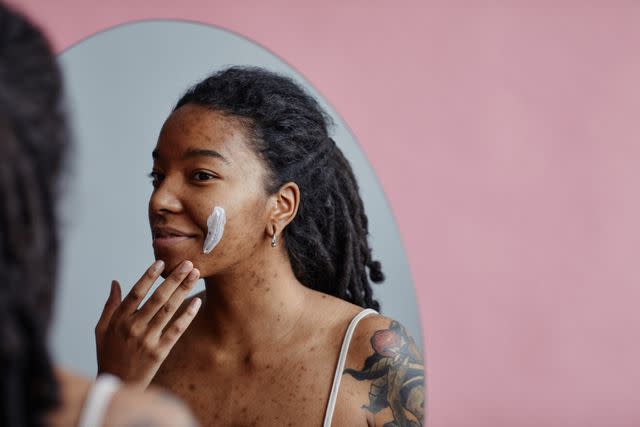Vitamin E for Scars: Worth Trying or Skipping?
Vitamin E creams and supplements alone won’t heal your scars
Medically reviewed by Susan Bard, MD
Vitamin E is a fat-soluble vitamin found in poultry, vegetable oils, and some fruits. The nutrient has recently been hailed as a viable option to reduce the appearance of scars when applied topically.
That said, little clinical evidence is available to back up these claims. This article discusses the benefits vitamin E possesses in terms of healing and alternative scar-fading techniques.

SeventyFour / Getty Images
Will Vitamin E Help My Scars Fade?
According to recent research, there is little to no benefit to using vitamin E on the skin to reduce the appearance of scars. Additionally, it may cause contact dermatitis.
Any evidence backing up claims that vitamin E will fade scars is purely anecdotal.
Vitamin E for Keloid Scars
A keloid scar is a thick, raised scar. Some people claim that vitamin E oil can help to reduce the appearance of these types of scars. However, as with other scar formations, no clinical evidence supports that it can help.
Benefits of Vitamin E for Overall Healing
There are several forms of naturally occurring vitamin E: alpha, beta, gamma, and delta. Among the two subgroups are tocopherols and tocotrienols, which are organic compounds with antioxidant, anti-inflammatory, and healing properties.
While using vitamin E to help reduce the appearance of scars doesn’t provide the results many people claim it does, the tocopherols and tocotrienols may possess some overall healing properties for the body.
These compounds have been shown to have a positive healing effect on various diseases, including:
Heart disease
Some cancers
Alzheimer's disease
Human immunodeficiency virus (HIV)
Other illnesses and disorders by enhancing immunity for better protection
When taken along with vitamin C, vitamin E may benefit other diseases, including:
Photodermatitis (skin reaction due to sun sensitivity)
Menstrual pain
Preeclampsia (characterized by high blood pressure, protein in the urine, and swollen legs in pregnancy)
Tardive dyskinesia (movement disorder causing repetitive motions)
The healing properties of vitamin E, stemming from its organic compounds, can improve the body’s overall ability to heal. That said, there is no evidence to support that it can heal scars specifically.
Why Did the Vitamin E Trend Start?
While the origin of using vitamin E for scar reduction isn’t well known, studies dating back to the late 1990s investigated the nutrient for its ability to help fade scars. Because the idea has been around for more than two decades, it’s hard to determine where it originated, considering the clinical evidence is essentially non-existent.
Learn More: What Vitamins Can Help With Inflammation?
Vitamin E Formulations With Complementary Ingredients
Vitamin E may be mixed with other ingredients, such as the following, to help reduce the appearance of scars:
Hydrocortisone, a steroid that helps reduce inflammation
Silicone sheets, which are silicone strips that help the area retain moisture and collagen during healing
Hydrocortisone plus a silicone sheet
Silicone plus collodion, a thick syrupy solution
Retinoids, typically used for acne scars
Vitamin C
The evidence to support the use of combination therapy with vitamin E is still scarce, and clinical studies have not yet found that using vitamin E, whether alone or with something else, can be beneficial in healing scars.
Vitamin E for Scar Prevention
While there is little evidence backing up claims that vitamin E will heal scars after they’ve formed, some older studies found that vitamin E can be beneficial if used on a wound following surgery and before scar tissue can develop.
The research indicates that people who have undergone surgery may be able to use vitamin E to prevent the formation of keloid scars because vitamin E helps wound healing. This leads to the theory that vitamin E may be a good prevention technique before scar tissue forms as opposed to afterward.
Related: 5 Essential Vitamins for Skin Health
Alternative Ways to Improve Scar Appearance and Texture
There are plenty of ways to reduce the appearance of scars other than using vitamin E. They include:
Massaging the scar tissue
Steroid injections, mainly for keloid scar prevention
Prescription cleaners or other wound care medications
Silicone gel or sheets
Laser therapy (pulsed-dye laser and CO2 laser)
5-fluorouracil (5-FU), a form of chemotherapy medicine
Bleomycin, a poisonous antibiotic used to kill cancer cells
Radiation therapy
Mitomycin C, a type of chemotherapy drug
Tension reduction
These methods each have their ways of working and offer different results for different types of scars. There are also scar creams that you can get through prescription or over-the-counter (OTC). They may also help to reduce the appearance of scars.
Learn More: How to Prevent or Minimize Surgery Scars
Summary
Vitamin E may be hailed as a new miracle regarding scar reduction and fading. However, the lack of clinical evidence suggests that using vitamin E for scars is ineffective and, thus, not necessary.
The only evidence to support the use of vitamin E to help with scars found that you would have to use it while the wound is healing. It can act as a prevention technique, not a healer. For scars to fade, you must use a type of therapy personalized to your scar. You can choose from many other options to minimize the appearance of scars.
Read the original article on Verywell Health.

